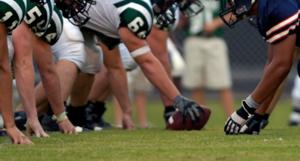Northwestern Players on the Verge of History

Football players at Northwestern University will make history this Friday that has nothing to do with yards gained, tackles made or touchdowns scored. They will be the first group of collegiate athletes—athletes who are the key to the $6 billion-a-year big-time college sports industry—to vote on joining a union.
Just getting to the vote was a major victory for the players, whose major concerns about fairness, working conditions, safety and medical care—especially after their playing days are over but their injuries are not—were not being heard or addressed by Northwestern. That’s why the players came together on their own and decided that the best way to win a voice was through collective action and a union.
Like workers everywhere, they want a voice on the job—and don’t let anyone tell you these football players are not working for the university and padding its bottom line through their jobs on the football field.
They want and deserve a say in how they spend as many as 60 hours a week under the tight control of coaches and the university, in honing their football skills while finding enough hours outside of football to keep up with their demanding academic responsibilities. I know how tough that can be. My son played football for Cornell University, and balancing the demands of football and the classroom could be daunting.
Like an ever-growing number of young people, Northwestern football players are finding out that collective action works and that unions can be a way to solve problems and improve their lives. On college campuses they’ve seen university workers, from food service employees to graduate assistants to professors, come together in unions and win on-the-job improvements and a more equal footing with university administrators.
But with a more focused awareness on how unions can help, young people also are finding out just how far employers and their allies will go to cajole and bully workers with lies and scare tactics.
Northwestern football coach Pat Fitzgerald has urged players to reject the union. The university recently distributed a 21-page, 75 Q&A document to the players telling them, among other things, that they can "get back to being students" by voting "No." According to CBSSports.com, which obtained a copy of the document:
When asked by a player what recourse is available if the vote passes and a player wants out, Northwestern inaccurately said they would be "stuck with the union for a minimum of one year, even if everyone changed their mind."
"And if the union tells you they would just walk away if the players change their mind, don't believe this for a minute," Northwestern says. "It is extremely difficult to get rid of a union once it is voted in."
More disturbing are reports that Northwestern alumni have suggested to players that if they vote to join a union, it could jeopardize their post-college careers with firms that have alumni in powerful positions.
According to The Daily Northwestern:
Former players have contacted current players, saying if they vote ‘Yes’ for the union on April 25, they will lose out on employment opportunities and other benefits of the football alumni network.
On Friday, Northwestern University football players will decide on their union and the AFL-CIO and the American labor movement are standing with them. While we may not know the outcome of the vote, there is one thing we know and something those Wildcat football players have learned in the past few months:
The lesson that strength comes from standing together is one the players have learned while fulfilling their 60-hour-plus weeks as football players, and it is true for all workers, whether they teach school, build Volkswagens in Chattanooga, Tenn., or serve as home health care workers.
***
This has been reposted from the AFL-CIO.

